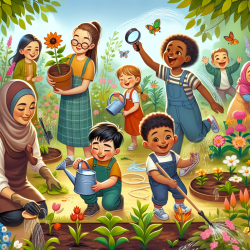The Transformative Power of Gardening in Early Childhood Education
As practitioners dedicated to the well-being and development of children, we constantly seek innovative methods to enhance their growth and learning experiences. A recent study titled "Gardening in Childcare Centers: A Randomized Controlled Trial Examining the Effects of a Garden Intervention on Physical Activity among Children Aged 3–5 Years in North Carolina" sheds light on an exciting opportunity: integrating gardening into early childhood education settings to promote physical activity and overall development.
Data-Driven Insights: The Study's Findings
This randomized controlled trial involved 321 children aged 3–5 years across 15 childcare centers in North Carolina. The intervention consisted of installing six raised garden beds and providing a gardening guide with age-appropriate activities. The results were compelling: children in the intervention group engaged in approximately six more minutes of moderate to vigorous physical activity (MVPA) and 14 fewer minutes of sedentary behavior each day compared to their peers in the control group.
These findings underscore the potential of gardening as a physical activity intervention, especially for young children. The study also highlighted that the effects were more pronounced in boys and the youngest children, suggesting that gardening can be particularly beneficial in fostering early physical activity habits.
Implications for Practitioners
For speech-language pathologists and educators, these insights open up new avenues for enhancing child development. Here are some practical steps to consider:
- Integrate Gardening into Curriculum: Incorporate gardening activities into your educational programs. This can involve planting, weeding, and harvesting, which not only promote physical activity but also offer rich opportunities for language development and sensory experiences.
- Customize Activities: Tailor gardening activities to suit the needs and interests of your students. For instance, storytelling sessions about plants can stimulate language skills, while hands-on activities can enhance motor skills.
- Collaborate with Parents and Communities: Engage parents and local communities in gardening projects. This can foster a supportive environment for children to continue their learning and physical activities outside of school.
Encouraging Further Research
While this study provides valuable insights, it also highlights the need for further research to explore the long-term impacts of gardening on child development. Future studies could examine the effects of gardening on cognitive and emotional development, as well as its potential to reduce disparities in physical activity among different demographic groups.
Conclusion
Gardening in childcare centers is more than just a fun activity; it is a powerful tool for enhancing physical activity and overall child development. By incorporating gardening into educational settings, practitioners can help children develop healthier lifestyles and improve their learning outcomes. As we continue to seek data-driven solutions to support child development, gardening offers a promising path forward.
To read the original research paper, please follow this link: Gardening in Childcare Centers: A Randomized Controlled Trial Examining the Effects of a Garden Intervention on Physical Activity among Children Aged 3–5 Years in North Carolina.










